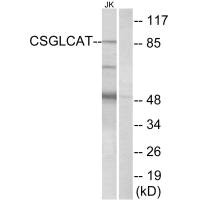CHPF2 Antibody
-
货号:CSB-PA164193
-
规格:¥2024
-
图片:
-
其他:
产品详情
-
产品名称:Rabbit anti-Homo sapiens (Human) CHPF2 Polyclonal antibody
-
Uniprot No.:Q9P2E5
-
基因名:
-
宿主:Rabbit
-
反应种属:Human
-
免疫原:Synthesized peptide derived from internal of Human CSGLCAT.
-
免疫原种属:Homo sapiens (Human)
-
克隆类型:Polyclonal
-
纯化方式:The antibody was affinity-purified from rabbit antiserum by affinity-chromatography using epitope-specific immunogen.
-
浓度:It differs from different batches. Please contact us to confirm it.
-
产品提供形式:Liquid
-
应用范围:ELISA,WB
-
推荐稀释比:
Application Recommended Dilution WB 1:500-1:3000 -
Protocols:
-
储存条件:Upon receipt, store at -20°C or -80°C. Avoid repeated freeze.
-
货期:Basically, we can dispatch the products out in 1-3 working days after receiving your orders. Delivery time maybe differs from different purchasing way or location, please kindly consult your local distributors for specific delivery time.
相关产品
靶点详情
-
功能:Transfers glucuronic acid (GlcUA) from UDP-GlcUA to N-acetylgalactosamine residues on the non-reducing end of the elongating chondroitin polymer. Has no N-acetylgalactosaminyltransferase activity.
-
基因功能参考文献:
- The present study focused on the expression of chondroitin-synthesizing enzymes in colorectal cancer. PMID: 21468578
- Results describe a novel human gene that possesses homology with chondroitin synthase. PMID: 12145278
- chondroitin polymerization is achieved by multiple combinations of ChSy-1, ChSy-2, CSGlcA-T, and ChPF and each combination may play a unique role in the biosynthesis of CS; CSGlcA-T is identified as chondroitin synthase-3 (ChSy-3) PMID: 18316376
-
亚细胞定位:Golgi apparatus, Golgi stack membrane; Single-pass type II membrane protein.
-
蛋白家族:Chondroitin N-acetylgalactosaminyltransferase family
-
组织特异性:Ubiquitous. Highly expressed in placenta, small intestine and pancreas.
-
数据库链接:
HGNC: 29270
OMIM: 608037
KEGG: hsa:54480
STRING: 9606.ENSP00000035307
UniGene: Hs.647084
Most popular with customers
-
-
YWHAB Recombinant Monoclonal Antibody
Applications: ELISA, WB, IF, FC
Species Reactivity: Human, Mouse, Rat
-
Phospho-YAP1 (S127) Recombinant Monoclonal Antibody
Applications: ELISA, WB, IHC
Species Reactivity: Human
-
-
-
-
-





















